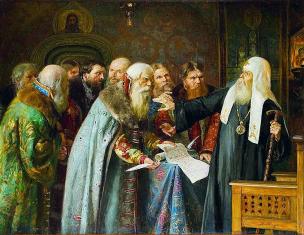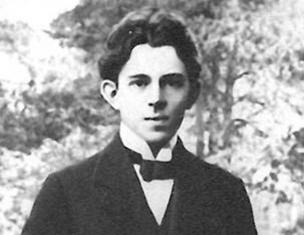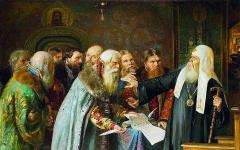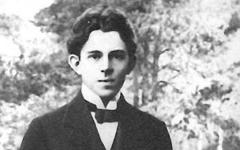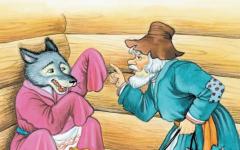Lesson Objectives:
- introduce children to literary works that instill love for the Motherland;
- form initial concept patriotism (as love for the Motherland based on examples of literary works).
- formation of moral consciousness;
- development of moral experiences and feelings;
- formation of moral behavior.
Lesson objectives:
- teach children to identify, analyze and evaluate behavior from the point of view of standards and samples presented in the literature;
- develop the ability to feel and understand others;
- cultivate love for the Motherland from the point of view of love for universal human values;
- develop a love for books as a source of knowledge.
Lesson topic:
Oh, Holy Motherland,
What heart does not tremble,
Blessing you?
V. Zhukovsky.
The “Song of Russia” plays, against the backdrop of which the children enter the classroom and stand at their seats.
My Russia has long braids,
My Russia has light eyelashes.
My Russia has blue eyes,
Russia, you look a lot like me.Chorus:
The sun is shining, the winds are blowing,
Showers are pouring over Russia.
There's a colorful rainbow in the sky
There is no more beautiful land!
The teacher announces the topic of the lesson. The children take their seats.
A poem performed by a student sounds:
Z. Aleksandrova “Motherland”.
If they say the word “Motherland”,
Immediately comes to mind
Old house, currants in the garden,
Thick poplar at the gate.By the river there is a shy birch tree,
And a chamomile hillock...
And others will probably remember
Your native Moscow courtyard.The first boats are in the puddles,
Where was the skating rink recently?
And a large neighboring factory
Loud joyful horn.Or the steppe is red with poppies,
Virgin gold...
Homeland is different
But everyone has one.
The teacher asks the children a question: name the name of our Motherland.
Indeed, this is our great power, whose name is “Russia”.
V. Stepanov “What do we call Motherland?”
What do we call Motherland?
The house where you and I live,
And the birch trees along which
We walk next to mom.What do we call Motherland?
A field with a thin spikelet,
Our holidays and songs,
Warm evening outside the window.What do we call Motherland?
Everything we cherish in our hearts.
And under the blue-blue sky
Russian flag over the Kremlin!
“Flag of Russia”.
White color - birch,
Blue - sky color,
Red stripe -
Sunny dawn.
Teacher. Indeed, the selection of colors is not accidental. It reflects centuries-old ideas of people about the world around them. They remind us who we are, where we came from and how long ago we came into this world, how many people and generations lived on our land before us.
The colors of the Russian flag tell the story of our long and glorious history.
(The teacher shows the encyclopedia “History of the Russian State”).
A student reads a poem:
V. Semernin “It’s called Motherland...”
There is such a miracle:
The land, forever beloved,
Above the river under the maple tree
Father's home, dear...
Seeing this miracle
The heart beats hotly
In life this is a miracle -
Homeland
Calling!
There is such a word
There is nothing more expensive:
There are fields and mountains in it,
It contains gardens and groves.
Remembering this word,
The heart beats sweetly
In life this word
Homeland
Calling!
The teacher asks the question: what does our father’s house, our small Motherland mean to us?
That's right, children, the city of Snezhinsk.
This city is located in the Urals.
The poem by V.V. Stepanov sounds:
Ural Mountains
On stone slabs
They lead us
To the land of malachite.
Working with books.
The teacher introduces the books:
– Stanislav Romanovsky “Motherland”.
– Rifkat Gadelshin “I was born on your Ural Land.” (the author is reading this work).
The teacher informs the children that poets live and work in the city of Snezhinsk who glorify the beauty of their hometown.
The lesson continues with reading other works about the Motherland.
M. Matusovsky “Where does the Motherland begin?”
Where does the Motherland begin?
From the picture in your ABC book,
From good and faithful comrades,
Living in the neighboring yard.
Or maybe it's starting
From the song that our mother sang to us,
Since in any test
No one can take it away from us.Where does the Motherland begin?
From the treasured bench at the gate,
From that very birch tree in the field,
Bowing in the wind, it grows.Or maybe it's starting
From the spring song of a starling.
And from this country road,
Which has no end in sight.Where does the Motherland begin?
From the windows burning in the distance.
From my father's old budenovka,
What we found somewhere in the closet.Or maybe it's starting
With the sound of carriage wheels.
And the oath that in my youth
You brought it to her in your heart.
M. Plyatskovsky “Motherland”
Can you hear the song of the stream?
This is your homeland.
Do you hear the nightingale's voice?
This is your homeland.Your mother's hands
The sound of rain and the noise of branches,
And in the forest there are currants -
This is also the Motherland!
Working with proverbs.
- To live is to serve the Motherland.
- For your Motherland, do not spare either strength or life.
- Beloved homeland - dear mother.
- The Motherland is your mother, know how to stand up for her.
Game: Thinking about the Motherland.
The teacher asks, and the children answer, in what situations does a person love his homeland, and in what situations does he not:
- a man returned from the forest with a bouquet of lilies of the valley;
- a man plants trees near his house;
- a man writes bad words on the walls;
- a man drove close to the lake in his car;
- a person throws garbage into a ditch, near the house, through a window;
- a person, after relaxing on a lake, buried garbage in the forest or took it home in a bag to throw it away in the right place;
- the person expresses himself obscenely;
- a man gives way to an elderly woman in public transport;
- a person loves his mother and always obeys her;
Here the teacher asks a question - Why do we say that if a person loves his mother, that means he loves his Motherland? (suggested answer - love for the Motherland begins with love for your mother).
Reading the fairy tale “Seven Daughters.”
Questions and tasks for the fairy tale.
- How was the seventh daughter different from her sisters?
- What do you think: what is more difficult - to speak beautifully or to act beautifully?
Teacher. To act beautifully means to find the meaning of life.
“The best pleasure, the highest joy of life is to feel needed and close to people” - M. Gorky.
Reading a story by children by V. Oseeva “Just an old lady.”
Questions and tasks for the text:
- did the boy do the right thing?
- what would you do in a similar situation?
- Is it possible to say that if you acted correctly in childhood, you will do the same in adulthood?
The teacher confirms the idea of the text that right actions speak of the high morality of a person who loves his homeland.
Working with books dedicated to the Motherland (working with an exhibition).
The teacher ends the open lesson with words from the poetic work of V. Zhukovsky:
Sweet light of the native sky,
Familiar streams
Golden games of the first years
And the first years of lessons,
What will replace your beauty?
Oh, holy homeland,
What heart does not tremble,
Blessing you?
The couple was again captured by the paparazzi. Recently, Dakota Johnson and Chris Martin were spotted on the streets of East Hampton. The star couple was caught by reporters at the exit from the barbershop, where the musician was getting a haircut, writes storinka.com.ua. Dakota would...
Kate Beckinsale in an original dress
The actress charmed with her appearance. The 10th anniversary charity gala evening Mon Chéri Barbara Tag was recently held in Munich, reports storinka.com.ua. The main star of the event was Kate Beckinsale. The star appeared in public in a spectacular black...
Children's drawing competition: Volganet.net will invite little artists to Narnia
Volganet.net is looking for talents! Talents among the best Volgograd residents - our children! We are announcing a competition children's drawing"My New Year" Children from 0 to 11 years old will be able to take part in the competition. To do this, to our email inbox)

